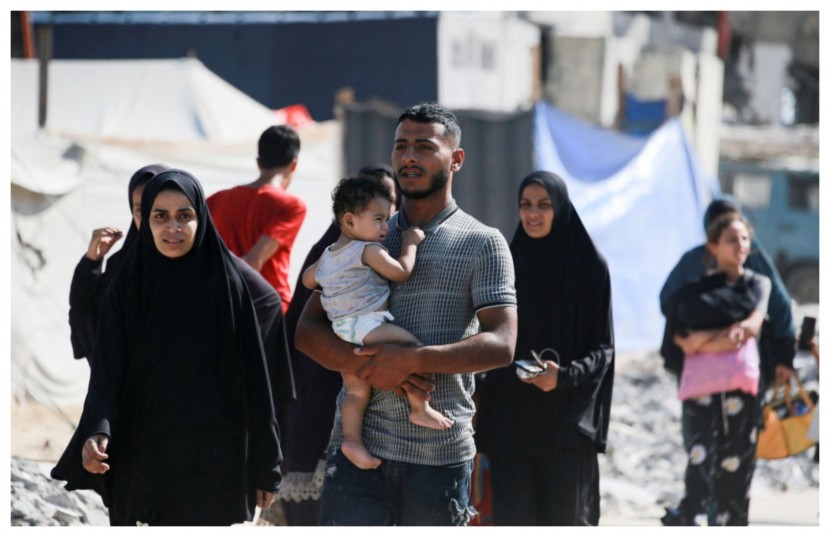
International pressure mounted Monday for a ceasefire in Gaza as Britain, France and Germany made a joint plea for an end to fighting between Israel and Hamas with "no further delay".
The call came a day after Palestinian militant group Hamas -- whose October 7 attack on Israel triggered the war -- urged mediators to implement a truce plan presented by US President Joe Biden instead of holding more talks.
"The fighting must end now, and all hostages still detained by Hamas must be released," French President Emmanuel Macron, German Chancellor Olaf Scholz and British Prime Minister Keir Starmer said in a joint statement.
"The people of Gaza need urgent and unfettered delivery and distribution of aid," it said.
"There can be no further delay."
International mediators have invited Israel and Hamas to resume talks towards a long-sought truce and hostage-release deal, after deadly Gaza strikes and the killings of Iran-aligned militant leaders sparked fears of a wider conflict.
Israel has accepted the invitation from the United States, Qatar and Egypt to send negotiators for talks planned for Thursday.
"The reason we're doing that is to finalise the details of the implementation of the framework agreement," Israeli government spokesman David Mencer told a news conference.
The government of Prime Minister Benjamin Netanyahu was slow to publicly embrace the proposal after Biden laid it out on May 31, and some far-right Israeli ministers still oppose it.
Hamas said Sunday it wanted the implementation of the plan, which Biden described as Israeli and was later endorsed by the UN Security Council, "rather than going through more negotiation rounds or new proposals".
Unveiling the plan, Biden had said the first phase of the proposed roadmap would include a "full and complete ceasefire" lasting six weeks, with Israeli forces withdrawing from "all populated areas of Gaza" and some hostages freed in exchange for Palestinian prisoners held by Israel.
The second phase would see the remaining living hostages released as the warring sides negotiate "a permanent end to hostilities", followed by "a major reconstruction plan for Gaza" and the return of dead hostages' remains.
Hamas on Tuesday named its Gaza chief Yahya Sinwar to succeed slain political leader and truce negotiator Ismail Haniyeh, killed July 31 in Tehran in an attack blamed on Israel, which has not claimed responsibility.
Haniyeh's killing, just hours after Israel assassinated the military chief of Lebanese group Hezbollah in a strike on Beirut, spurred intense diplomacy to avert a wider war in the Middle East.
Israeli Defence Minister Yoav Gallant told a parliamentary commission on Monday that the country had strengthened its defences and organised "offensive options" as "threats from Tehran and Beirut may materialise".
Pressure for a ceasefire in Gaza grew after civil defence rescuers in the Hamas-run territory said an Israeli air strike on Saturday killed 93 people at a school housing displaced Palestinians.
Gaza officials told AFP on Monday that they had identified the bodies of 75 of those killed, while others were charred and torn apart.
AFP could not independently verify the toll which, if confirmed, would be one of the largest from a single strike during the 10-month-old war.
Israel said it targeted militants operating out of Gaza City's Al-Tabieen school and mosque with "precise munitions".
The military published the names of 31 people it said were militants who died in the raid.
The Gaza war began with Hamas's October 7 attack on southern Israel which resulted in the deaths of 1,198 people, mostly civilians, according to an AFP tally based on official Israeli figures.
Israel's retaliatory military offensive in Gaza has killed at least 39,897 people, according to a new toll from the territory's health ministry, which does not provide a breakdown of civilian and militant deaths.
The toll includes 107 deaths in the previous 48 hours, according to ministry figures.
Iran, Hamas, Hezbollah and other regional allies have vowed retaliation against Israel for Haniyeh's killing and that of Hezbollah's military chief Fuad Shukr.
US Defence Secretary Lloyd Austin ordered an aircraft carrier group to hasten its arrival in the Middle East, the Pentagon said Sunday.
The UN agency for Palestinian refugees, UNRWA, said that in recent days more than 75,000 people had been displaced in southwest Gaza.
The entire Gaza Strip has a population of about 2.4 million people.
In the city of Khan Yunis on Sunday, ravaged by months of bombardment and battles, AFP journalists said hundreds of Palestinians had fled northern neighbourhoods after Israel issued fresh evacuation orders.
"We have to go somewhere, and we don't know if it will be good or bad," said Majd Ayyad, as families gathered their meagre belongings and left in pick-up trucks, on foot or using donkey-drawn carts.
On Monday, residents told AFP Israel struck Khan Yunis and Rafah from the air.
Palestinian group Islamic Jihad, which has been fighting alongside Hamas in Gaza, said its militants were battling Israeli troops in Khan Yunis.
In the Nuseirat refugee camp in central Gaza, Suhail Abu Batihan said Israeli bombardment was "causing terror" among residents.
"We demand that the Palestinian negotiator, the world, Qatar and Egypt intervene to stop this war."








